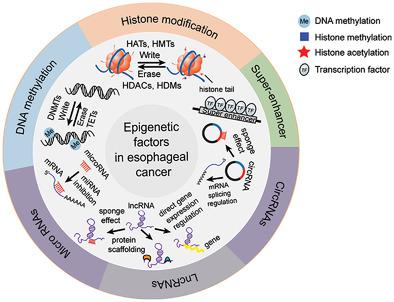当前位置:
X-MOL 学术
›
Small Methods
›
论文详情
Our official English website, www.x-mol.net, welcomes your
feedback! (Note: you will need to create a separate account there.)
Epigenetics in Esophageal Cancer: From Mechanisms to Therapeutics
Small Methods ( IF 10.7 ) Pub Date : 2020-08-09 , DOI: 10.1002/smtd.202000391 Long Liao 1 , Zi‐Ting Yao 1 , Wang‐Kai Fang 2 , Qing‐Yu He 1 , Wen Wen Xu 3 , Bin Li 1
Small Methods ( IF 10.7 ) Pub Date : 2020-08-09 , DOI: 10.1002/smtd.202000391 Long Liao 1 , Zi‐Ting Yao 1 , Wang‐Kai Fang 2 , Qing‐Yu He 1 , Wen Wen Xu 3 , Bin Li 1
Affiliation

|
Esophageal cancer is a leading cause of cancer‐related deaths worldwide. In the past few years, the roles of epigenetics in cancer have been fully accepted. Recently, there has been an increased focus on epigenetic alterations underlying esophageal cancer carcinogenesis, with several epigenetic drug and RNA interference therapies being tested. However, the conclusion that epigenetic alterations are linked directly to an increased or decreased risk of esophageal cancer is less certain. Therefore, there is an urgent need to test novel epigenetic biomarkers for diagnostic and prognostic significance and to explore their potential as therapeutic targets. In this review, the discussion is concentrated on epigenetic alterations involving super‐enhancers, DNA methylation, histone modifications, and multiple noncoding RNAs (ncRNAs), including microRNAs (miRNAs), long noncoding RNAs (lncRNAs), and circular RNAs (circRNAs), and their impact on tumor growth, invasion, metastasis, and drug resistance. Then specific instances of using epigenetic drugs, such as DNA methyltransferase and histone deacetylase inhibitors, to treat esophageal cancer are described. Recent developments in miRNA‐based therapeutic strategies, including antagomirs, lock nucleic acids, miRNA sponges, and microRNA replacement therapies, against esophageal cancer are also highlighted.
中文翻译:

食道癌的表观遗传学:从机理到治疗学
食道癌是全球癌症相关死亡的主要原因。在过去的几年中,表观遗传学在癌症中的作用已被完全接受。最近,人们越来越关注食管癌致癌作用的表观遗传学改变,正在测试几种表观遗传学药物和RNA干扰疗法。然而,表观遗传学改变与食管癌风险增加或降低直接相关的结论尚不确定。因此,迫切需要测试新型表观遗传生物标志物的诊断和预后意义,并探索其作为治疗靶标的潜力。在这篇综述中,讨论集中在表观遗传改变,包括超级增强子,DNA甲基化,组蛋白修饰和多个非编码RNA(ncRNA),包括microRNA(miRNA),长非编码RNA(lncRNA)和环状RNA(circRNA),以及它们对肿瘤生长,侵袭,转移和耐药性的影响。然后描述了使用表观遗传学药物(例如DNA甲基转移酶和组蛋白脱乙酰基酶抑制剂)治疗食道癌的具体实例。还强调了基于miRNA的治疗策略的最新进展,包括针对食管癌的antagomirs,锁核酸,miRNA海绵和microRNA替代疗法。
更新日期:2020-10-07
中文翻译:

食道癌的表观遗传学:从机理到治疗学
食道癌是全球癌症相关死亡的主要原因。在过去的几年中,表观遗传学在癌症中的作用已被完全接受。最近,人们越来越关注食管癌致癌作用的表观遗传学改变,正在测试几种表观遗传学药物和RNA干扰疗法。然而,表观遗传学改变与食管癌风险增加或降低直接相关的结论尚不确定。因此,迫切需要测试新型表观遗传生物标志物的诊断和预后意义,并探索其作为治疗靶标的潜力。在这篇综述中,讨论集中在表观遗传改变,包括超级增强子,DNA甲基化,组蛋白修饰和多个非编码RNA(ncRNA),包括microRNA(miRNA),长非编码RNA(lncRNA)和环状RNA(circRNA),以及它们对肿瘤生长,侵袭,转移和耐药性的影响。然后描述了使用表观遗传学药物(例如DNA甲基转移酶和组蛋白脱乙酰基酶抑制剂)治疗食道癌的具体实例。还强调了基于miRNA的治疗策略的最新进展,包括针对食管癌的antagomirs,锁核酸,miRNA海绵和microRNA替代疗法。











































 京公网安备 11010802027423号
京公网安备 11010802027423号